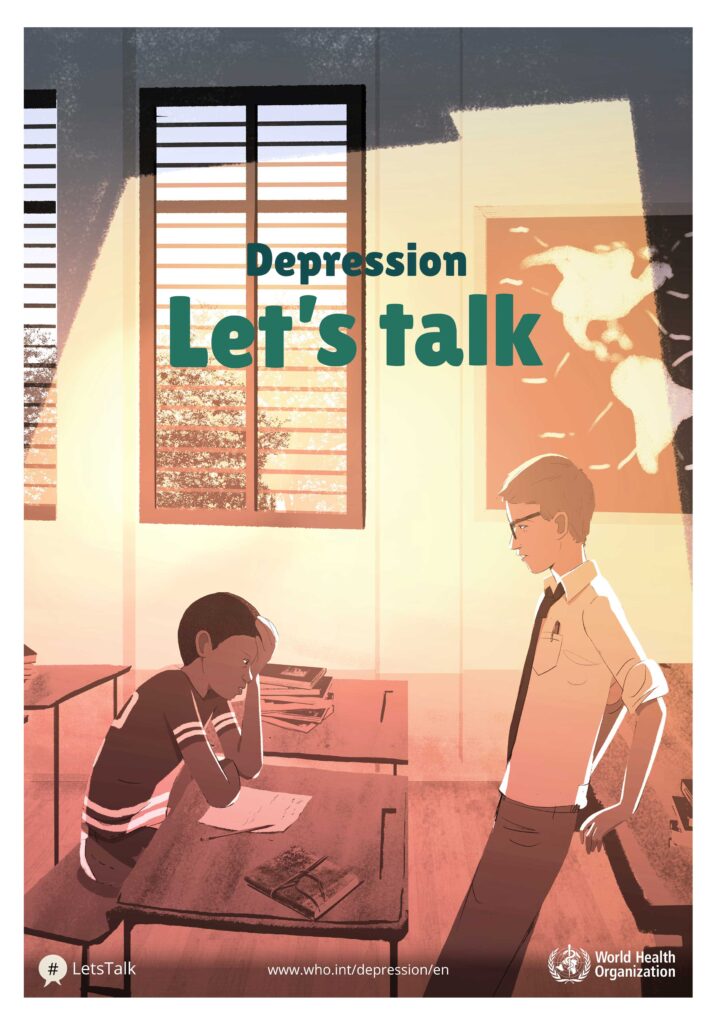At the beginning of May we wrote about depression, which was timely considering that the debilitating mental illness was the focus of the World Health Organization’s World Health Day (April 7, 2017). If you did not read the article, no worries, we can give you a little recap. The World Health Organization (WHO) launched a year-long campaign called, “Depression: Let’s Talk” to illuminate the public about the fact that over 300 million people around the world suffer from depression. WHO has determined that the mental illness is one of the leading causes of poor health in the world.
If people are unwilling to talk about the mental health disorder due to fear of social stigma, the whole world suffers. For every person touched by the illness, there are exponentially more people who are close to the afflicted whose lives are affected. By encouraging people to talk about their disease, we have a better chance of such people seeking help. In the realm of addiction medicine, it is abundantly clear that untreated mental illness of any form is correlated with an increased risk of substance use and abuse. Simply put, those who ignore their mental health disorder, by not seeking help, are on an easy course to addiction.
In the 21st Century, a time where the use of social media is ubiquitous, our ability to have open discussions about not only mental illness, but also the effective treatments available is significantly greater than in decades past. What’s more, the ability of scientists to disseminate facts about mental illness and that mental health problems beget other mental health issues—is greatly improved by the internet.
With that in mind, we also know now that problems like anxiety, depression and bipolar disorder often begin at a young age. And if it can be screened for early on, then it can be treated before behaviors like self-medicating with drugs or alcohol develop.
Depression Affects Teenage Boys and Girls
At PACE Recovery, we specialize in the treatment of addiction affecting young men. However, it is relevant to discuss how mental health is a problem for both sexes. A new study of data regarding children’s mental health in the United States, showed that depression can begin in children at age 11, The Washington Post reports. The data indicates that 13.6 percent of boys and 36.1 percent of girls have experienced or are depressed by age 17. The results of the study highlight the importance of early screening. The findings were published in the journal Translational Psychiatry.
The researchers admit that the reasons why females are at greater risk of depression in adolescence are not well understood, according to the article. Teenage boys, the data shows, are more likely to have problems with conduct, aggression and substance abuse; whereas depression appears to be much more common among girls. Understanding the reasons why for the time being, in many ways, pales in comparison to the importance of parents, teachers and medical professionals keeping a close eye for signs and symptoms of depression. Failure to do so, as you well know (probably), can have disastrous consequences—addiction and suicide to name a couple.
When you are seeing young people with symptoms consistent with depression it is really much, much better to get them connected to a pediatrician to get them a comprehensive mental health assessment and hook them into treatment sooner rather than later,” said study author Elizabeth Miller, director of the division of adolescent medicine at Children’s Hospital of Pittsburgh.
Young Adult Rehab Program
In a perfect world every child, of either sex, would be screened early on and regularly for mental illness. Unfortunately, we are not at that point, yet. The fact is, many young men experiencing symptoms of mental illness make it through high school without ever having been screened, and as a result turn to mind-altering substances to cope with their symptoms. As is clearly evident by the prevalence of young adults in need of substance use disorder treatment in America.
The good news or silver lining, in a sense, is that mental illness, whether it be depression, addiction or both, can be treated. Recovery is possible and the trained professionals at PACE Recovery Center can help you break the cycle of addiction and learn how to live a fruitful life in recovery. Please contact us today to begin the process, it is likely to be one of the most important phone calls you ever make.




